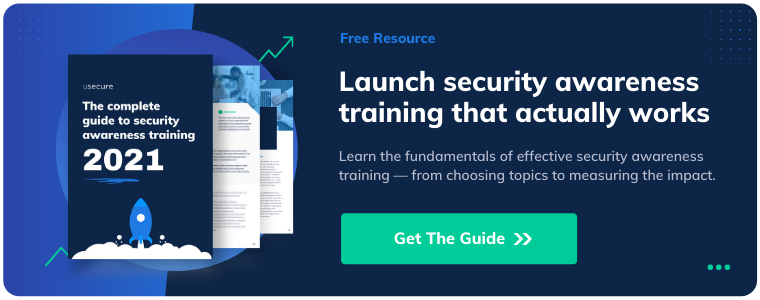What is the importance of security awareness training?
Security awareness training is being rolled out in companies of all sizes. Training can take many forms - from company-wide lectures to phishing simulations - and contain content on any variety of cyber security topics. But why is security awareness training so important, and what benefit can it provide to your business?
In this article, we'll explore how security awareness training is important because it allows your company to:
- Protect credentials and log-in details
- Secure premises and networks
- Keep customer and business data safe
- Maintain your brand reputation
- Save money
Training helps protect credentials
Phishing scams are the number one cyber threat to most businesses. They can take many forms, but one of the most common are emails that attempt to dupe end users into giving up their credentials. It's generally not hard for a cyber criminal to find out which online tools and services a company uses - or they can just go for common ones like Microsoft 365 or Gmail - and they can use this knowledge to build fake log-in pages and branded emails that dupe unsuspecting users into typing in their passwords. Once users give up their passwords, the cyber criminal has free access to the company network.
Technical tools like spam filters and two-factor authentication are essential to help stop attacks like these. However, no spam filter is foolproof, and end users have to be trained in spotting and reporting suspected phishing emails to reduce the risk of a breach. It's also essential that end users are taught why enabling security features such as two-factor authentication is essential for their and their business' security.
Training helps stop unauthorised access
While phishing emails are commonly used by cyber criminals to gain unauthorised access to company systems, security awareness training also helps businesses prevent other forms of unauthorised access, such as physical infiltration of premises.
Tailgating is a common method for criminals to gain unauthorised access to secure physical premises such as office buildings. If employees access secure premises, it is essential that they are trained to spot, challenge and report tailgating attacks to prevent criminals from walking into premises. Training also helps end users understand the risks posed by sharing ID or swipe-cards, as well as comply with practices such as clean desk policies to help prevent accidental exposure of confidential data.
Training reduces the likelihood of data breaches
Cyber criminals have become experts in making money from just about any type of information. While bank and credit card details are obviously lucrative, just about any personal or business information can now be sold on the dark web, where it is then gathered together to be used in attacks like identity theft.
There are a variety of cyber attacks that are used to gain personal and business data. These range from templated and spear phishing emails to spyware that collect keystrokes and man-in-the-middle attacks that gather data on public Wi-Fi networks. Educating end users in best security practices wherever they work from and whatever tools they use is essential to keeping your business and customer data secure.
Training protects your company's reputation from damage
More and more consumers are waking up to the importance of data privacy. In the wake of recent large-scale data breaches and concerns about security on social media platforms, many consumers now actively seek out information on the privacy features of products and services they use, and place security at the top of their priority list. There is almost nothing that will turn away these customers from your business as quickly as news of a data breach.
Minimising the risk of a data breach is essential to safeguard the reputation of your company and to preserve its relationships with customers. In addition to training end users on security best practices, educating them about just how damaging a data breach can be to the company's reputation is essential to help end users understand why they need to keep security in mind every single day that they work for your business.
Security awareness training saves your business money
At the end of the day, it is only beneficial for companies to spend money when they know that they will make a return from it. This is no less the case with spending money on security training programmes - and the facts speak for themselves.
In 2020, the average cost of a cyber breach to a small business was £8,500, with a far higher figures for medium and large businesses. 39% of all businesses had at least one breach. Even the most comprehensive security awareness training is likely to pay for itself if it stops just one breach every year, making it a smart investment for just about any business.
Get started with the one-stop security awareness platform
Realistic phishing simulations and automated training are essential to secure your business. With modern phishing, ransomware and social engineering attacks, no business can afford to risk facing the costly fallout of a large-scale cyber breach.
usecure is your one-stop shop for addressing human error in your organisation. Train your users with our automated cloud-based training courses that are personalised to address each individuals' weak points, and carry out regular phishing simulations with our best-in-class simulated phishing tool.
Learn more about launching effective phishing and security awareness training with usecure's free 2021 guide below, or try usecure's security awareness training courses with a free 14-day trial.


